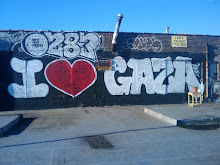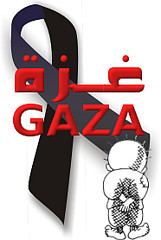Dr. Eyad El Sarraj is a psychiatrist in the Gaza Strip, and a founder of the Gaza Community Mental Health Program, and is, in my eyes, a saint. A few weeks ago he wrote in the Boston Globe about his daughter's lack of understanding why this war happened. The work ahead of him, his staff, and the teams of community members they are training is tremendous and overwhelming.
On January 26, 2008, Dr. Sarraj wrote an Op-Ed in the Boston Globe asking why the stranglehold on Gaza was acceptable...why it was ok for Livni to spell out that it was "inconceivable that life in Gaza continues to be normal." And now, a year later, we are asking why Israel's attack on Gaza was "acceptable" and wonder that it is inconceivable that life in Gaza continues today.
Amidst the reports of trauma and death, people speak constantly in bewilderment of Palestinians' resilience. In my studies of mental health I have learned that two of the major sources of resilience are feeling you have control over your future-- that is actively resisting your stressful surroundings--and strong social networks. Palestine is a collectivist society, and much strength is drawn from large, closely knit family structures. Studies have found that one of the most frequently mentioned ways Palestinian children identify to contribute to the Palestinian resistance, is to attend school, educate themselves, and become professionals. I wonder where Noor, Sarraj's stepdaughter, will go to school now that Israel bombed hers.
Palestinians are indeed a incomprehensibly strong and resilient people. But resilience implies that there are difficult circumstances/environments against which to struggle and overcome. Palestinians don't want to be resilient...they want to live.
Subscribe to:
Post Comments (Atom)



No comments:
Post a Comment